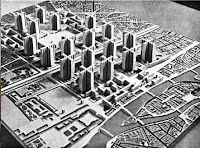Vaclav Havel, playwright, dissident, former Czech president died today at the age of 75. His obituary is all over the media. My favorites are the Christian Science Monitor’s, Vaclav Havel: Remembering the Czech President, Playwright, and Peacenik David Remnick’s, Postscript: Vlaclav Havel, 1936-2011 in the New Yorker online.
I’m tempted to post the whole essay here, but it’s too long for a comfortable blog, and there may be copyright issues. Instead I’ll excerpt a little bit below with a link to the English translation.
Havel wrote:
Totalitarian power brought bureaucratic order into the living disorder of history and thus effectively anesthetized it. In a sense, the government nationalized time. Thanks to that, time encountered the same sad fate as many other nationalized entities: it began to wither away.
 |
| Frank Zappa & Valcav Havel |
On a very different note, Havel’s relationship with Frank Zappa.
“Frank Zappa was one of the gods of the Czech underground. I thought of him as a friend Whenever I feel like escaping from the world of the Presidency, I think of him.” Zappa and Václav hit it off immediately.
Zappa was appointed as “Special Ambassador to the West on Trade, Culture and Tourism”. Czechs treated Zappa as a national hero, and he was even talking about applying for citizenship. Meetings were held with Zappa, Havel, his finance ministers and the Ministry of Culture and Trade. Frank had some ideas about increasing their tourism viability by converting some old castles into hotels and dealing with airlines to get more visitors into the country. There was also talk about credit cards and television shopping networks, both new concepts in Czechoslovakia. The main question was how to get western goods and services into the country.
Two weeks later, US Secretary of State James Baker re-routed a trip through Europe to visit Václav Havel. At the time, Czechoslovakia was applying for badly needed aid from the US Government. Baker’s message was short and simple: Havel could either do business with the United States or he could do business with Frank Zappa. It would seem Baker had a bit of an axe to grind, since Zappa had insulted his wife, Susan Baker, before a Senate Committee hearing in Washington DC back in 1985 regarding censorship of rock albums and the PMRC. The PMRC, or “Parents Music Resource Center”, sought legislation for censorship of rock records. In the Senate hearing, Zappa referred to Susan and the others in the PMRC as “a group of bored Washington housewives”, and it would seem James Baker had not forgotten the insult. Zappa’s career as an international trade ambassador was over nearly as fast as it had begun.
 |
| Vaclav Havel & Lee Reed at Columbia |
And this little story about a night out on the town with Havel, Zappa, Madaeline Albright, Lou Reed and Laurie Anderson. It can’t get any stranger that this.
Madeliene Albright and Lou Reed? Even more scary: US aid to the new Czech state was contingent on Havel’s shooing away Frank Zappa? So much for the Cold War!
Havel at Columbia has a collection of video interviews with Lou Reed about Havel.
Elegie from Egon Bondy’s Happy Hearts Club Band by Plastic People of the Universe





Thanks Marley. Havel is one of my heroes. Here is my favorite quote from him, sent by a friend when I felt hopeless about my reunion:
“Hope is a state of mind, not of the world . . . Either we have hope or we don’t; it is a dimension of the soul, and it’s not essentially dependent on some particular observation of the world or estimate of the situation.
Hope is not prognostication. It is an orientation of the spirit, and orientation of the heart; it transcends the world that is immediately experienced, and is anchored somewhere beyond its horizons . . .
Hope, in this deep and powerful sense, is not the same as joy that things are going well, or willingness to invest in enterprises that are obviously heading for success, but rather and ability to work for something because it is good, not just because it stands a chance to succeed. The more propitious the situation in which we demonstrate hope, the deeper the hope is.
Hope is definitely not the same thing as optimism. It is not the conviction that something will turn out well, but the certainty that something makes sense, regardless of how it turns out.”
Vaclav Havel